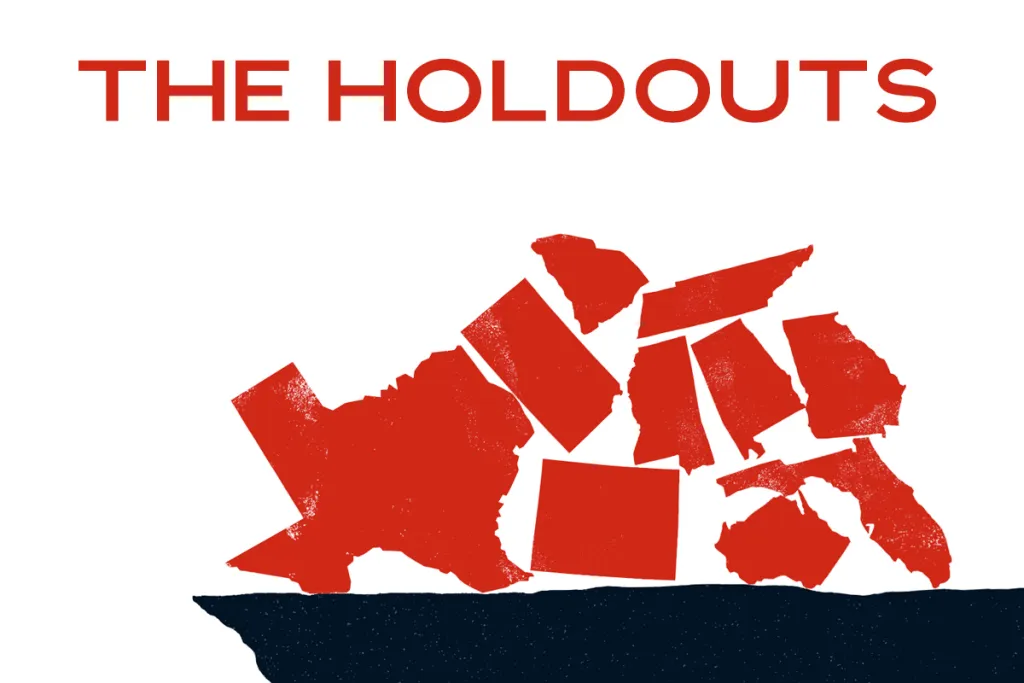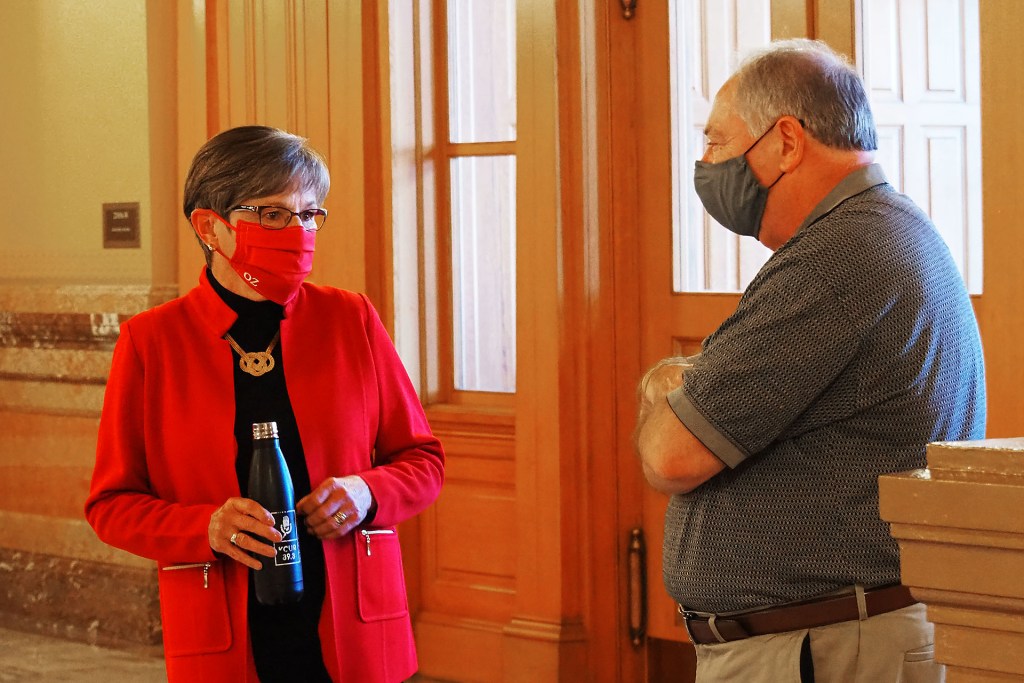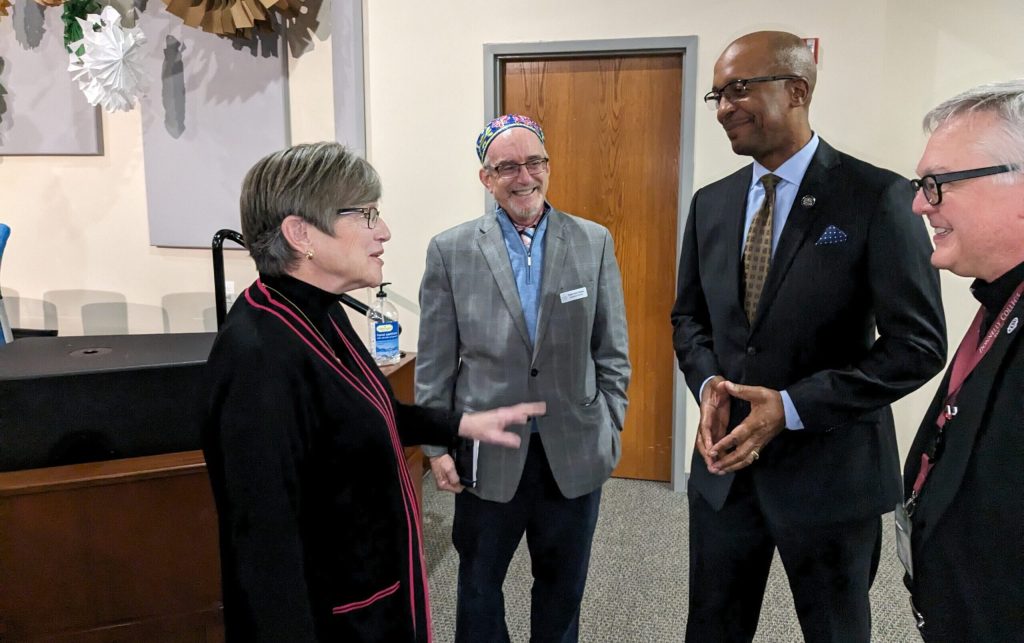
This commentary is part of a Kansas Reflector series examining the impact of the state’s refusal to expand Medicaid.
Dec. 11: The uninsured.
Dec. 12: Struggling hospitals.
Dec. 13: Impact on jails.
Dec. 14: Church bells toll.
The number to remember today, to remember every day in Kansas, is 1,500.
That’s the number of Kansas adults whose deaths can be blamed on the stubborn refusal of state officials to expand Medicaid. Not a few dozen or hundred, but 1,500 souls, their lives cut short for the sake of ideology.
I want you to etch that number in your mind: 1,500. We’re going to be talking about morality today, and any claims about what’s right or wrong when it comes to expansion must be weighed against that staggering toll. We’re going to broach the subject of religion, and we know how insistent a certain breed of cleric can be on the topic of life and one’s right to it.
So just remember that 1,500 Kansans have died.
What about their right to life?
I began to ponder this after onetime Senate Majority Leader Jim Denning pointed a finger at Kansas City Kansas Archbishop Joseph Naumann for the failure of expansion in 2020.
That was the year that Denning, an Overland Park Republican, unveiled a compromise expansion proposal with Democratic Gov. Laura Kelly. That was the year, folks thought, that expansion would finally arrive in the Sunflower State.
In an interview for the Kansas Oral History Project in April, Denning told interviewer Alan Conroy: “When I thought it was going to be a slam dunk, in this business, you never know from day to day what’s going to happen. Sure enough, the Republicans wanted a constitutional amendment on the abortion issue, and Bishop Naumann from Kansas City, Kansas, basically stopped Medicaid expansion.
“So if you were an opponent of Medicaid expansion, then he’s your guy. If you were a proponent, you’re mad at him. He single-handedly torpedoed the bill because he said, ‘You can’t vote for Medicaid expansion until the abortion amendment passes with the public.’ So he killed it. It never came out of committee.”
Chuck Weber, executive director of the Kansas Catholic Conference, objected to that version of history.
According to Kansas Reflector’s Rachel Mipro, he said blaming Naumann was “simply not accurate.”
However, Weber submitted testimony on Nov. 12, 2019, that said the Catholic Conference’s support of expansion was contingent on three factors, including this one: “Kansas must adopt a state constitutional amendment excluding abortion as a ‘natural right.’ ”
Denning’s account sounds pretty accurate to me.
Calculating the Toll
A report published in the Lancet last year found that Medicaid expansion was associated with 11.8 fewer deaths per 100,000 adults ages 25-64 annually. This allowed me to create the number used in this column. (Read more about the study.)
I divided 100,000 into 1,457,923 — the total Kansas population between those ages in the 2020 U.S. Census. I multiplied the result by 11.8 and then by nine, the number of years that Kansas has gone without expansion. The state’s population has varied slightly over those nine years, so the result (1,548) is an approximation. I use a lower rounded number, 1,500.
Other estimates have been created. University of Kansas professor Donna Ginther has cited 648 probable deaths based on a paper from The Quarterly Journal of Economics. That research, however, focuses on the near-elderly.
I reached out to Weber for more information. He said the question had been asked and answered before, and pointed me to a “clarification of our testimony” that appeared in the Kansas City Star on Nov. 25, 2019. The column appears to mostly repeat the points already made by all parties.
Of more interest was Weber’s account of why the 2020 deal fell apart. He blames Kelly’s support for abortion rights as lawmakers debated the “Value Them Both” amendment.
“Based on my own on-the-ground conversations, this ‘Medicaid Expansion for a VTB Vote’ compromise was all but done deal,” he said. “Unfortunately, though not surprisingly, Gov. Kelly cared more about so-called ‘abortion rights’ than she did about the health of all Kansans.
“In the worst-kept secret at the time in the Statehouse, every Democrat and a small but decisive number of Republicans had their marching orders — no VTB ‘yes’ vote. … I know this because I was working in the trenches and was in conversation with other lobbyists [and] legislators from both parties. My only regret is not being able to convince enough legislators to place VTB on the ballot at that time, which would have led to Medicaid expansion in Kansas.”
Which, depending on how you look at it, also suggests that Catholic leaders were willing to sacrifice the good of health care expansion on the altar of abortion politics. (You can read the full text of my questions and Weber’s answers here.)
By the time the anti-abortion rights amendment cleared the House and Senate in 2021, Denning had retired. Expansion hadn’t moved. In the runup to the amendment vote on Aug. 2, 2022, Catholic donors contributed $3.5 million to strip women of their state constitutional right to reproductive health services. That’s according to reporting from Miranda Moore of the Wichita Beacon.
The Archdiocese of Kansas City in Kansas, led by Naumann, was the single largest contributor on either side, spending $2.45 million.
That money came to naught, with the anti-abortion amendment failing, 59-41. So Catholic leadership had its say. Notably, Medicaid still wasn’t expanded in the 2023 session, and lawmakers passed even more abortion restrictions.
I should note here that politicians and activists who link the issues of abortion and expansion ignore the fact that Medicaid can’t pay for the procedure most of the time anyway.
According to the Kaiser Family Foundation: “Federal law only allows the use of federal funds for abortion in cases of rape, incest or life endangerment of the pregnant person; in most states, Medicaid coverage for abortion is limited to these circumstances.”
You still recall the number, right? It’s 1,500.

‘Distressed and Dying’
Notably, other people of faith — including other Catholics — have spoken up.
Sister Therese Bangert, social justice coordinator for the Sisters of Charity of Leavenworth, noted that her order built the first private hospitals in Kansas. They went ahead and welcomed anyone who needed help.
“We didn’t ask whether they had money or not,” Bangert said. “They were cared for. So we ask that you will trust us when we tell you that Kansans, through no fault of their own, are distressed and dying from unmet medical needs, because they do not have reliable affordable health care.”
A personal note: I worked with Sister Therese during my time in the nonprofit sector. She’s as close to a modern-day saint as they come.
Monsignor Stuart Swetland, president of Donnelly College in Kansas City, Kansas, and pastor of Our Lady and Saint Rose Catholic Church, went right ahead and said what I did at the beginning of this column. If you want to support a pro-life policy, Medicaid expansion fits the bill.
“When you say someone has a right to something you speak of the moral truth — that others and that person have a duty to provide that. Parents have a right to educate their children. That means they have the duty to make sure their children are educated well in all things,” he said.
That means that if Kansans have a right to quality health care, the state has a duty to provide them with insurance that pays for it.
If the Catholic Conference wanted poor Kansans to have access to health care, its officials could speak with a powerful voice. They could lend lobbying and financial resources to the cause, much as they did to the anti-abortion amendment. That kind of effort has a way of making even the most recalcitrant lawmakers sit up and pay attention. It heightens the stakes. It might even push the bill over the finish line.
Weber sent along a column that will be published soon in a Catholic newspaper. In it, he offers this less-than-stirring support: “The KCC supports Medicaid Expansion while also acknowledging that government-sponsored insurance is a flawed solution.”
As humans, surely, none of our solutions to problems are perfect. So what?
Weber’s piece includes a stirring recitation of all the good the church does across the state in a multitude of areas: “If you need a meal, Catholics will feed you. If you’re cold, we’ll get you a coat. Homeless? The Catholic Church has sheltered countless individual Kansans and families over the years and continue to do so. Our advocacy for the human person on many, many levels — migrants, the I/DD community, those suffering from mental illness, domestic violence and more, including the preborn — will continue despite a rising tide of anti-Catholic bigotry.”
That’s great. I’m heartened that the church does so much good in the state. That doesn’t make church leaders any less mistaken in their half-hearted, fingers-crossed “support” for expansion. Or any less responsible for the consequences.
Remember: 1,500 dead Kansans.
You don’t have to settle for my outrage that rank-and-file church members carry the burden while their leaders fixate on losing culture-war issues. A fairly famous Catholic shares my view of the situation. He was born Jorge Mario Bergoglio but now goes by Pope Francis.
“You have seen that in the United States the situation is not easy: There is a very strong reactionary attitude,” the pope told Jesuits in Lisbon, Portugal, the Reuters news service reported. “It is organized and shapes the way people belong, even emotionally.”
In the United States, he said, “one can lose the true tradition and turn to ideologies for support. In other words, ideology replaces faith, membership in a sector of the Church replaces membership in the Church.”

‘A trigger statement’
Others join Weber in disagreeing with Denning’s characterization that the church “single-handedly” deserves blame.
April Holman works as executive director at the Alliance for a Healthy Kansas, one of the main nonprofits working toward Medicaid expansion in Kansas. She didn’t have time for the former Senate majority leader’s blame game.
“Jim Denning made that statement that the Catholic Church was the one that killed expansion,” she told Kansas Reflector editor Sherman Smith. “I have a problem with that. I think Jim Denning killed expansion the year before. It had already gotten through the House, and we just needed to get it through the Senate. So while I don’t argue about the role that the Catholic Church had the year that they were trying to get Value Them Both through, they have since said that they’re supportive. They don’t think it’s gonna happen and they’re not helping to make it happen, but they’re no longer holding it back. And I hate to give Jim Denning more credit than he deserves.”
She added, after a pause: “It’s a trigger statement for me because he made that and, like, just absolved himself, I guess, of all responsibility.”
Indeed, other state leaders bear responsibility as well. Former Republican Gov. Sam Brownback vetoed expansion in 2017 after a proposal made it through both the House and Senate. Legislators failed to override him, having expended significant political capital that year to repeal his trademark tax “experiment.”
Former Senate President Susan Wagle and former House Speaker Ron Ryckman both went out of their way to block expansion efforts in their respective chambers.
Current Senate President Ty Masterson and House Speaker Dan Hawkins have been outright hostile to the suggestion.
Supporters have grumbled about one another for years on the subject, too. Either those backing expansion haven’t done enough for the cause or they’ve done too much — witness the agita that accompanied the unfurling of “blood on their hands” banners by outspoken activists back in 2019.
When something goes wrong, humans want a person to blame. If they can’t find a specific person, legend suggests they’re perfectly happy to heap their accusations on an innocent goat.
As 40 states have expanded Medicaid — including all of those bordering Kansas — advocates and the otherwise politically engaged have looked for their own scapegoat. Some criticisms have more merit than others. Both Denning and Holman make compelling cases.
Yet this blame game serves to distract us from what really matters: that number.
Those 1,500 Kansans who saw their time on this Earth shortened by those who purported to care for them. If advocates and opponents alike united in tribute to these people, their fellow Kansans, we might finally break this unhealthy cycle. We can save lives for generations to come.
This column is part of “The Holdouts,” a reporting collaborative focused on the 10 states that have yet to expand Medicaid, which the Affordable Care Act authorized in 2010. The collaborative is a project of Public Health Watch.
Clay Wirestone is Kansas Reflector opinion editor. Through its opinion section, Kansas Reflector works to amplify the voices of people who are affected by public policies or excluded from public debate. Find information, including how to submit your own commentary here.

